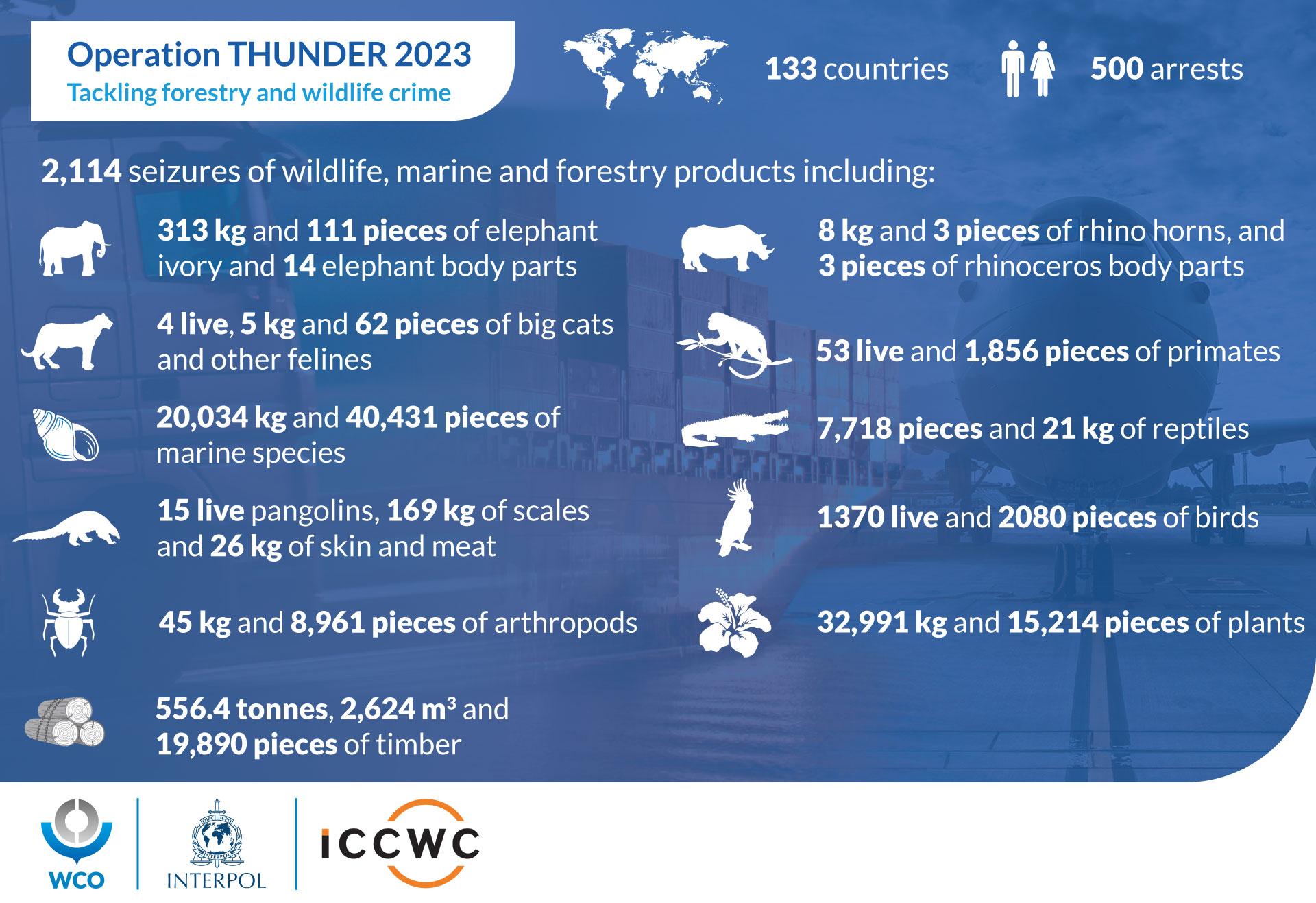
2,114 seizures of endangered animals and timber as part of a major international law enforcement operation
BRUSSELS : As the world grapples with the devastating consequences of environmental degradation and species extinction, law enforcement authorities worldwide join forces in fighting wild fauna and flora trafficking.
Endangered animals including elephants, rhinos and pangolins, as well as protected timber, particularly tropical hardwoods, have been seized in a joint World Customs Organization (WCO) – INTERPOL operation to stop wildlife and timber trafficking.
From 2 – 27 October, customs and police officers coordinated some 500 arrests worldwide and more than 2,000 confiscations of animals and plants that are protected under the Convention on International Trade in Endangered Species (CITES) due to their threatened status. All trade performed in breach of CITES is illegal.
A collaborative effort with multiple stakeholders, the global operation, named Operation Thunder, involved customs, police, border control, environment, wildlife and forestry officials in 133 countries who worked together across borders, marking the highest participation rate in Thunder operations since the series was launched in 2017.
Among the 2,114 seizures were more than 300 kg of ivory, thousands of turtle eggs, 30 tonnes of plants, dozens of big cat body parts and rhino horns as well as primates, birds and marine species.
Authorities also confiscated 2,624 cubic metres of timber which is equivalent to 440 standard shipping containers.
Although Thunder 2023 results are still coming in, initial data has enabled police and customs to identify some clear trends:
- High number of wildlife and timber trafficking cases were linked to complex operations involving transnational organized crime entities.
- Online sales platforms are still being used to sell wildlife, timber, and marine goods.
- Illegal and legal timber are blended to make it difficult to detect its illicit origin.
- Document fraud is widely used, including the use of forged certifications and CITES permits, and permit reuse.
“As part of a comprehensive strategy, customs play a pivotal role in disrupting criminal networks involved in the illegal wildlife trade. This is achieved by enforcing strict controls at borders, effectively closing off avenues for exploitation and financial gain available to traffickers,” said WCO Secretary General Dr Kunio Mikuriya.
“At the forefront of this strategy, customs employ intelligence-sharing, collaboration, and technological advancements. These measures are crucial to stay one step ahead of criminals, thereby ensuring that customs’ contribution to combating wildlife crime is dynamic and adaptive,” added Dr Mikuriya.
Officers from the WCO Secretariat and INTERPOL shared intelligence, coordinated investigations, and pooled resources to enable frontline police and customs officers to target, identify and arrest traffickers, including those operating over the internet, as they tried to smuggle animals or timber across borders.
“Wildlife and forestry crimes deprives countries of their natural assets and are invariably linked to armed violence, corruption, and a wide range of financial crimes which serve as the backbone of larger transnational crime operations worldwide,” said INTERPOL Secretary General Jurgen Stock.
“As the world grapples with the devastating consequences of environmental degradation and species extinction, INTERPOL and WCO are emerging as key players in safeguarding biodiversity and world security,” added Mr Stock.
Known traffickers wanted through INTERPOL’s Red Notice alert system were identified ahead of operations and targeted.
”The results of Operation Thunder 2023 again show that strong and coordinated responses between Parties are crucial to tackle transnational criminal networks involved in wildlife crime,” said CITES Secretary-General, Ms. Ivonne Higuero.
“Well targeted, collective and coordinated efforts such as those mobilized through this global operation are exactly what is needed to overcome the threat posed by wildlife crime,” added Ms. Higuero.
Hundreds of vehicles, including cars, trucks, and cargo ships, were meticulously searched at checkpoints across all regions. Specialized sniffer dogs and X-ray scanners were deployed to detect hidden wildlife and camouflaged timber shipments. Hundreds of parcels and suitcases were also examined as they are often used to transport wildlife species at border control.
Now in its seventh year, Operation Thunder is a joint operation coordinated annually by the WCO and INTERPOL with the backing of CITES Secretariat and the International Consortium on Combating Wildlife Crime (ICCWC).Thunder operations are funded by the European Commission’s Directorate General for International Partnerships, Norway’s International Climate and Forest Initiative, the US Agency for International Development and the UK’s Department for Environment, Food and Rural Affairs.
Operation Thunder 2023 coincides with the 2023 United Nations Climate Change Conference – Conference of the Parties of the UNFCCC (COP28) which ends today after high level discussions on how to address pressing environmental challenges characterized by climate change and biodiversity loss.
